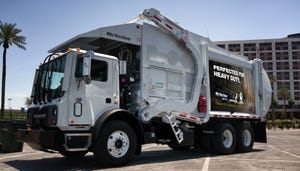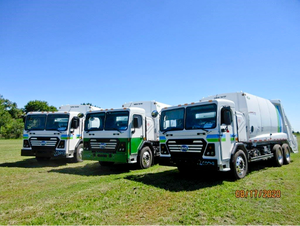Management: Slovenia Stymied By Solid Waste Disposal Options
November 1, 1996
John W. Sutherlin
What are the impediments to sound solid waste management (SWM) in the former communist state of Slovenia?
The answer is both allusive and unsettling, but not altogether un-solvable, according to a recent re-port based on a joint U.S. Environ-mental Protection Agency (EPA)/ State Department workshop held in Slovenia.
Slovenia gained its independence from Yugoslavia in 1991 and now has the highest gross national product of the former communist states. It has remained virtually unaffected by the war in Bosnia-Herzegovinia and currently seeks to join the European Union (EU). And, it seems poised to further its development as it promotes better environmental policy.
Despite passing the Environ-mental Protection Act in June 1993, Slovenia still has some interesting anomalies, including the way residents are charged for waste disposal. Here, residents are assessed a monthly fee based on size of their homes, excluding cellars and garages. When this changes, "an assessor must return and adjust the monthly waste fee," said Emil Eberl, a professor at Slovenia's Institute for Mining Geo-technology and Environment.
Several of these "waste-idiosyncrasies," exist, but it is the larger ones that present the most serious challenges. These include the limits of geography and population and the residuals of a communist government.
Slovenia, with less than 21,000 square kilometers, is a small central European state surrounded by Italy, Austria, Hungary and Cro-atia, at the juncture of four geographic regions: the Alps, the Pan-nonian Plain, the Dinaric Mountain Range and the Mediterranean. Al-though its size alone would not preclude Slovenia from developing an integrated SWM approach, the nation's lower half is mostly karst and not ideal for landfill siting.
The upper region lies in the Di-naric Mountain Range, which, due to excessive transportation costs, is not a prime location either. This only leaves the sparsely populated west or Ljubjana, the capital city. By transporting the waste from the more densely populated central and eastern parts to the west, again, costs dramatically increase. As result, Slovenia is turning to waste-to-energy (WTE).
The problem with this solution, however is that with fewer than two million people, Slovinia lacks the necessary tax base to support more than one state-of-the-art WTE facility.
Foreign financing also is out of the question: state-law prohibits foreign companies from owning Slovenian land and any company incorporated in the nation must have a Slovenian managing director or a predominantly Slovene board.
As a result, no foreign company would choose to op-erate under such restrictions and no national company can.
Technically, Ljubjana, which is connected by road and rail to all parts of the nation, is the facility's ideal site. However, the Mini-stry of the Environ-ment and Regional Planning, which also is charged with preserving "the di-versity, cultural and aesthetic worth of the landscape," has found this alternative unacceptable.
Also, local governments are left in the precarious position of trying to satisfy the environmental and economic wants and needs of a newly sovereign state.
At a workshop in Ljubjana this past May, Slovenian and American SWM experts presented alternatives to business, industry and government representatives.
One suggestion was regionalization. In a study conducted by University of New Orleans, regionalization, if adopted, would save the state of Louisiana an estimated $1 billion over twenty-years, with parish groups using a common landfill. Slovenia could join with Italy, Austria and, possibly, Croatia for joint disposal projects, plus recycling and composting.
Regional disposal facilities could be operated through cooperative international agreements under the auspices of the EU and assistance from either the World Health Or-ganization or the United Nations Environmental Programme.
Also, these could be linked to other environmental areas, such as disposal of nuclear and hazardous waste. With SWM becoming more of an economic development issue for emerging states such as Czech and Poland, this regional approach could have the twin benefit of de-creasing SWM costs and increasing environmental compliance.
For further information on the workshop or study, contact: John W. Sutherlin, Research Associate, Urban Waste Management & Research Center, Department of Civil & Environmental Engineering, University of New Orleans, New Orleans, La. 70148. (504) 280-6189. Fax: (504) 280-5586. E-mail: [email protected].
You May Also Like


